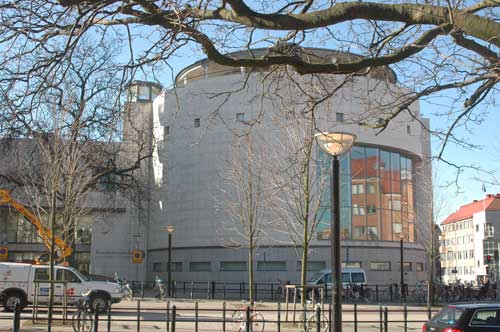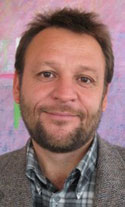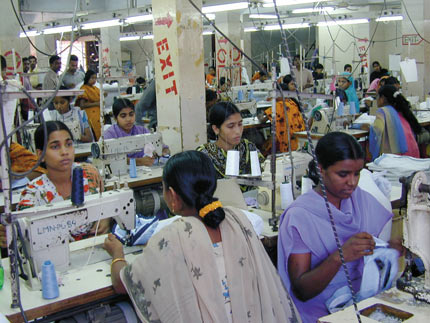SWEDISH SOUTH ASIAN STUDIES NETWORK
Department of Economics, School of Business, Economics and Law,
University of Gothenburg
 Postal address: Institutionen för
nationalekonomi med statistik, Handelshögskolan vid Göteborgs
universitet (HGU),
Box 640, SE-405 30 Göteborg, Sweden
Postal address: Institutionen för
nationalekonomi med statistik, Handelshögskolan vid Göteborgs
universitet (HGU),
Box 640, SE-405 30 Göteborg, Sweden
Visiting address: Vasagatan 1, House E,
4th floor,
and Södra Allégatan 8
Web page: http://www.hgu.gu.se/item.aspx?id=1014
South Asia related research
at the department
 Associate Professor Gunnar
Köhlin is working at the Environmental Economics Unit (within the Department
of Economics), being its Director since 2007.
Associate Professor Gunnar
Köhlin is working at the Environmental Economics Unit (within the Department
of Economics), being its Director since 2007.
Dr. Köhlin
has been involved in much India related research,
mainly in Orissa. Since 1991, he has been coordinating institutional
collaboration between Sida and the Environmental Economics Unit
concerning Environmental Economics and Development, and since
1997 been coordinator for the Sida-supported PhD program in environmental
economics at Göteborg
University. More
information on Dr. Köhlin’s personal web
page.
Recent South Asia related publications include:
Gundimeda, H. and G. Köhlin (2008), ‘Fuel demand elasticities for energy and environmental policies: Indian sample survey evidence’, Energy Economics, 30/2: 517-546.
Gupta, G. and G. Köhlin (2006), 'Preferences for domestic fuel: Analysis with socio-economics factors and rankings in Kolkata, India', in Ecological Economics, Vol. 57/1 pp 107-121.
Köhlin, G. and G. S. Amacher (2005), 'Welfare Implications of Community Forest Plantations in Developing Countries: The Orissa Social Forestry Project', in American Journal of Agricultural Economics, 87(4):855-869.
Köhlin, G. and P. J. Parks (2001), 'Spatial Variability and Disincentives to Harvest: Deforestation and Fuelwood Collection in South Asia', in Land Economics, 77 (2): 206-218.
Köhlin, G. and M. Ostwald (2001), 'Impact of plantations on forest use and forest status in Orissa, India”, in Ambio, Vol. 30:1.
Köhlin, G. (2001), 'Contingent valuation in project planning and evaluation - The case of Social Forestry in Orissa, India', in Environment and Development Economics, 6:237-258.
 On 12 March 2008, Dr. Farzana Munshi from Dhaka, Bangladesh, defended her doctoral dissertation at the department. The thesis was entitled ”Essays on Globalization and Occupational Wages”. The discussant was Associate Professor Karolina Ekholm, Department of Economics, Stockholm University. The thesis evaluates empirically how globalization has affected occupational wages in both developing and developed countries. Three aspects of globalization – openness to trade, openness to capital and offshore-outsourcing – are examined in four self-contained essays. The first two essays evaluate the effects of increased trade liberalization on the wage gaps between skilled and unskilled workers in the Bangladesh manufacturing sector. The third and the fourth essays analyze the effects of globalization on occupational wages in both developing and developed countries. More information, with link to full-text thesis.
On 12 March 2008, Dr. Farzana Munshi from Dhaka, Bangladesh, defended her doctoral dissertation at the department. The thesis was entitled ”Essays on Globalization and Occupational Wages”. The discussant was Associate Professor Karolina Ekholm, Department of Economics, Stockholm University. The thesis evaluates empirically how globalization has affected occupational wages in both developing and developed countries. Three aspects of globalization – openness to trade, openness to capital and offshore-outsourcing – are examined in four self-contained essays. The first two essays evaluate the effects of increased trade liberalization on the wage gaps between skilled and unskilled workers in the Bangladesh manufacturing sector. The third and the fourth essays analyze the effects of globalization on occupational wages in both developing and developed countries. More information, with link to full-text thesis.
Dr. Munshi has now returned to Bangladesh, and joined the Dept. of Economics and Social Sciences, BRAC University in Dhaka as Assistant Professor in 2009.
Earlier, in 2006, Farzana Munshi published her Licentiate thesis as a paper in the department’s Working Papers in Economics series No. 241. It was entitled ”Does openness reduce wage inequality in developing countries? A panel data analysis”. The thesis provided panel data evidence on trade liberalization and wage inequality in Bangladesh, using several standard econometric models, wage equations for skilled and unskilled workers in the formal manufacturing sector are estimated for the 1975-2002 period. The results, particularly the estimates from a dynamic fixed effects model, provide some weak evidence that openness contributes to a reduction in wage inequality between skilled and unskilled workers. The results also indicate that real wages of both unskilled and skilled workers increased during the period. Read the full working paper.
Minhaj
Mahmud defended
his doctoral dissertation titled ”Measuring
Trust and the Value of Statistical Lives: Evidence from Bangladesh" on
1 April 2005. The thesis deals with the concept of trust, decreased
significantly as the stake size was increased in a trust game conducted
in rural Bangladesh. It includes five self-contained essays.
The first three essays relate to the measurement of trust using
both an experimental and a survey approach, and the other two essays
relate to the measurement of the value of (statistical) life using
stated preference methods. Read
the abstract.
Since October 2006, Dr. Mahmud, originally from Bangladesh (Jahangirnagar
University), is working at the School
of Biological Science at Queen's
University in Belfast, Northern Ireland, as lecturer in Environmental
Economics.
The thesis work was part of a research project dealing
with the concept of trust in Bangladesh, built on field work in
2004, in which Dr. Mahmud
worked together with Professor Olof
Johansson-Stenman and the researcher Peter
Martinsson.
Jointly the three researchers published
three papers on the issue in the Scandinavian
Working Papers in Economics publication series:
No 140: ”Does
stake size matter in trust games?”. Abstract: In
a trust game conducted in rural Bangladesh, the proportion of money
sent decreased significantly with the stake size. Still, even with
very large stakes few followed the conventional economic prediction
and sent nothing.
No 166: ”Trust,
Trust Games and Stated Trust: Evidence from Rural Bangladesh”. Abstract: Levels
of trust are measured by asking standard survey questions on trust
and by observing the behaviour in a trust game using a random sample
in rural Bangladesh. Follow-up questions and correlations between
the sent amount in the trust game and stated expectations reveal
that the amount sent in the trust game is a weak measure of trust.
The fear of future punishment, either within or after this life,
for not being sufficiently generous to others, was the most frequently
stated motive behind the respondents’ behaviour,
highlighting the potential importance of motives that cannot be
inferred directly from people’s behaviour.
No 167: ”Trust
and Religion: Experimental Evidence from Bangladesh”. Abstract: Trust
is measured using both survey questions and a standard trust experiment
using a random sample of individuals in rural Bangladesh. We found
no significant effect of the social distance between Hindus and
Muslims in the trust experiment in terms of fractions sent or returned,
but the responses to the survey questions indicate significant
differences: Hindus, the minority, trust other people less in general,
and Hindus trust Muslims more than the other way around.
A couple of years ago, Peter Martinsson spent some months in India and made a study on social inequality. This may result in a number of working papers. Currently, he is involved in research about the concept of happiness. Since Bhutan and its former king Jigme Singye Wangchuck has evolved an alternative development index named Gross National Happiness (instead of the traditional GNP), this might become an object for Martinsson’s research.
Prof. Johansson-Stenman has also carried out studies on social inequality in India. Together with Fredrik Carlsson (also at the department) and Gautam Gupta from the Dept. of Economics, Jadavpur University, Kolkata, India, he published an article in the magazine Applied Economics Letters in 2002, titled 'Choosing from Behind a Veil of Ignorance in India'. It was also published a sa working paper at the department. More information.
Recent publications include:
Carlsson, Fredrik, Gautam Gupta and Olof Johansson-Stenman "Keeping up with the Vaishias: Caste and relative standing", Oxford Economic Papers, forthcoming.
Carlsson, Fredrik, Gautam Gupta and Olof Johansson-Stenman (2003) “Choosing from behind a veil of ignorance in India”, Applied Economics Letters, 2003, 10, 825-27.
SASNET - Swedish South Asian
Studies Network/Lund University
Address: Scheelevägen 15 D, SE-223 70 Lund, Sweden
Phone: +46 46 222 73 40
Webmaster: Lars Eklund
Last updated
2010-12-23
